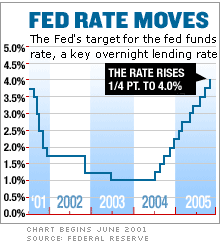 |
| Santa Al or Mr. Gr(eenspan)inch? It all depends on whether the word "measured" is in the next Fed statement. |
|
 |
|
|
|
|
|
|
| More about the Fed and economy
|
|
|
|
|
NEW YORK (CNNMoney.com) -
Will the financial markets view Federal Reserve Chairman Alan Greenspan as Santa Claus or the Grinch after the Fed's next policy meeting Tuesday?
It all depends on whether one simple word is in the statement that the central bank will release following its meeting: "measured."
Since the Fed began raising interest rates in late June 2004, it has kept this language in its statement at every meeting: that "policy accommodation can be removed at a pace that is likely to be measured." Translation: Expect more interest rate hikes, probably a quarter-percentage point, in the future.
To be sure, the market is fully prepared for the Fed to boost its target for the fed funds rate, an overnight bank lending rate, to 4.25 percent from the current 4 percent.
According to futures contracts listed on the Chicago Board of Trade, investors are betting there's a 96 percent chance of a quarter-point increase and a small chance of half-point hike. Investors are pricing in another quarter-point move at the Fed's Jan. 31 meeting, which will be Greenspan's last, as well.
But if the Fed does raise another quarter point Tuesday, the fed funds rate would stand at 4.25 percent, a level many economists and bond market analysts feel is very close to the desired "neutral" rate meant to keep the economy growing without causing significant inflation.
With that in mind, many think that the Fed should soon pause to see if more rate hikes are truly needed. So if the Fed gets rid of "measured", investors will probably respond with a hearty "Ho ho ho!"
But if "measured' remains, they are more likely to sing, in a deep baritone no less, "You're a mean one, Mr. Greenspan. You really are a heel."
The Fed may have tipped its hand...
The Fed itself has actually fueled hopes that it might soon modify its statement.
According to the minutes from its last meeting in November, the Fed indicated that "several aspects of the statement language would have to be changed before long, particularly those related to the characterization of and outlook for policy" and added that "some members cautioned that risks of going too far with the tightening process could also eventually emerge." Tightening monetary policy means raising rates.
For this reason, several Fed watchers said they expect a significant change to the statement on Tuesday.
"I think the Fed will change the wording and get rid of measured," said Brian Stine, investment strategist with Allegiant Asset Management, an institutional firm based in Cleveland. "Greenspan wants to get to neutral on his watch and the Fed will want to change the wording to suggest that it's almost done."
After Greenspan steps down in January, he is due to be replaced by Ben Bernanke, a former Fed governor and White House adviser. Bernanke's first meeting as Fed chair will be March 28.
David Resler, chief economist with Nomura Securities International Inc., agreed that the Fed clearly can afford to signal to the market that it's almost done with its rate hiking campaign. A pickup in inflation still does not appear to be a major threat, despite relatively high energy prices, he said.
"Most people would say that a neutral zone is as low as 3 percent and as high 5 percent. Nobody would doubt right now that we are in the range of neutral if (core) inflation stays at 2 percent annually," Resler said.
He added that the Fed would be doing a favor to the markets by getting rid of "measured" since he thought it was a particularly useless term in the first place.
"Is it possible that the Fed would ever move in a way that wasn't measured? The opposite of measured would be unmeasured. What would that be? Totally random moves? Measured was always a dumb word to me," Resler said.
So if the Fed gets rid of measured, what would it say instead? "They can leave out the sentence about accommodation and say that future actions will be based on incoming data," said Stine.
In a report Friday, Ashraf Laidi, chief currency analyst with MG Financial Group, suggested that the Fed adopt the following statement: "The Committee believes that policy accommodation has neared a level that is deemed to be neutral consistent with the balanced objectives of both sustainable growth and price stability."
Laidi argues that this language gives the Fed flexibility to keep raising rates in the coming months if further data indicates that inflation is becoming a problem.
...but don't play taps for "measured" just yet?
But not everyone is convinced that the "measured" language has seen its last days.
"The November minutes were taken as a sign of an impending pause and I don't think the Fed wants to give that message. If the economy is still growing fast, they may have to raise rates above 5 percent," said Chris Probyn, chief economist with State Street Global Advisors in Boston.
Probyn said that other than some signs of cooling in the housing market, the economy still looks to be in healthy shape. He pointed to the upward revision in the third-quarter gross domestic product to a robust 4.3 percent, strong gains in productivity, a pickup in job growth and rising consumer confidence as evidence that supports more rate hikes.
"This doesn't look like an economy that's rolling over. This looks like an economy that has shown resilience and continues to move ahead," Probyn said.
To that end, the Fed may keep "measured" until it is convinced that the economy is in danger of cooling. What's more, some say it doesn't make sense to make changes now since Bernanke can do that when he takes over.
"I don't think we'll see a major change. We need more evidence of a slowdown but signs point to an economy that's still growing," said Dave Kupic, vice president of fixed income strategy and research for Advantus Capital Management, a money management firm based in St. Paul, Minn. "Changes are more likely in conjunction with Bernanke coming in."
And some suggest that even if the Fed does remove "measured", the market shouldn't interpret that to mean that the Fed will in fact pause in March. In other words, investors would be wise to pay more attention to economic numbers and spend less time trying to decode cryptic Fed-speak.
"You might have a situation where the Fed raises rates, modifies the language a little bit but intends to keep on going," said David Joy, chief market strategist with RiverSource Investments, the asset management division of Ameriprise Financial. "If the market assumes that it's one more and done that might be a misread."
For more coverage of the Fed, click here.
For more about bonds and interest rates, click here.

|